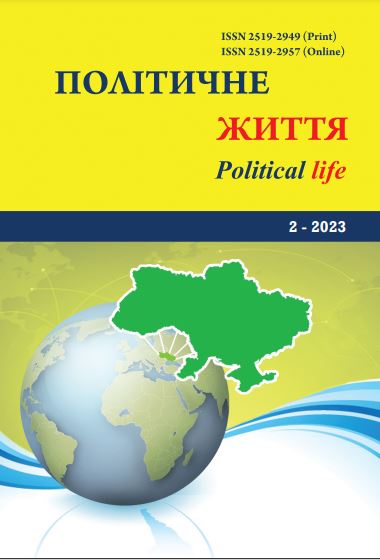Belief and mistrust as value-motivating attitudes of people’s behavior
DOI:
https://doi.org/10.31558/2519-2949.2023.2.12Keywords:
faith; trust; distrust; political process; democratic developmentAbstract
The common and distinctive features of the categories "faith" and "trust" and their relationship are analyzed. In particular defined that, trust practically follows from faith, that is, it is its result. Faith as an emotional-sensual, irrational instruction has a tendency to be rationalized, substantiated with logical arguments, supplemented with rational postulates. As a result, the basis of policy legitimation is no longer faith in itself, but trust, which includes it, as well as rational postulates and calculations. Trust, thus, is essentially a derivative of faith and reason.
In general, trust has a huge influence on political process. Trust – it is important mechanism of political participation, democratic development, which ensures possibility of permanent relations in political, economical, law, social and other spheres. It is initially formed as a result of interpersonal interaction and cooperation within the framework of formal and informal institutions of civil society, later it becomes the basis for the creation of not only a nationwide network of institutions of civil society, but also contributes to the strengthening of trust in the political institutions that operate, which contributes to the formation of civil culture.
It is substantiated that trust, as a phenomenon, fills an important link in the process of communication between political subjects of all levels, because although it increases the potential possibility of deception, it significantly simplifies the process of verification of information received during communication, provides ample opportunities for cooperation, cooperation. And, on the contrary, mistrust significantly complicates communication, hindering the circulation of information and distorting its content. Trust is a product of individual experience. Due to the frequent repetition of this experience and its institutionalization, political trust is consolidated. The deficit of political trust creates a situation in which the development of many democratic institutions is impossible. An alternative to this development of political relations are hierarchical and formalized organizations built on bureaucratic principles.
References
Політологічний словник: Навч. посіб. для студ. вищ. навч. закл. / За ред. М. Ф. Головатого та А. В. Антонюка. Київ: МАУП, 2005. 792 с.
Білошицький С. Криза довіри громадськості до представницьких політичних інститутів. Політичний менеджмент. 2009. № 2. С. 56–66.
Нагорняк Т.Л., Наталіна Н.О., Польовий М.А. Політична суб’єктність в умовах формування нового світо порядку. Політологічний вісник: збірник наукових праць / голов. ред. О. В. Батрименко; Київський національний університет імені Тараса Шевченка. Київ: ТОВ «Вадекс», 2021. Вип. 87. С. 218-240.
Демартіно А.П. Політична стабільність: до проблеми осмислення наукового розуміння та практичної реалізації. Політологічний вісник: збірник наукових праць / голов. ред. О. В. Батрименко; Київський національний університет імені Тараса Шевченка. Київ: ТОВ «Вадекс», 2021. Вип. 86. С. 161-173.
Політологічний енциклопедичний словник / Упорядник В. П. Горбатенко; За ред. Ю. С. Шемшученка, В. Д. Бабкіна, В. П. Горбатенка. Київ: Генеза, 2004. 736 с.
Индуизм. Доверие и вера. Лекция по «Бхагавад-Гите» [Электронный ресурс]. Режим доступа:http://www.simhome.ru/religion/12265.
Оссовський В.Л. Методологічні проблеми соціологічного дослідження цінностей професійної діяльності. Філософська думка. 1986. № 1. С. 48-56.
Філософія політики. Короткий енцикл. словник / Авт. Упоряд.: Андрущенко В. П. та ін. Київ: Знання України, 2002. 670 с.
Обушний М.І. Політологія: Довідник / М. І. Обушний, А. А. Коваленко, О. І. Ткач ; за ред. М. І. Обушного. Київ: Довіра, 2004. 599 с.
Ревель Ж.-Ф. Відживлення демократії = Le regain democratidue. Пер. з франц. 3. Борисюк, О. Хома. Київ: Критика, 2004. 592с.
Грицюта Н. Імператив довіри як морально–етична категорія рекламної діяльності. Теле- та радіожурналістика: збірник наукових праць; Львівський нац. ун. ім. Івана Франка. Львів, 2010. Вип. 9. Ч. 1. С. 306-313.
Маринович М. Журналіст має бути моральним і в аморальному суспільстві. Журналіст України; Національна спілка журналістів України; Київський національний університет імені Тараса.Шевченка. Київ, 2008. № 9. С. 33-37.
Мащенко С.Т. Любов до мудрості і віра: Вибрані статті з історії вітчизняної філософії та релігії. Чернігів: РВК «Деснянська правда», 2006. 176с.
Архієреєв C.I., Зінченко А.В. За межами вибору між ефективністю та справедливістю: міжнародний підхід: монографія. Xарків: ХНУ ім. В. Н. Каразіна, 2008. 172с.
Зайцев С.В. Особливості визначення рівня довіри особистості. Вісник Київського національного університету імені Тараса Шевченка. Соціологія. Психологія. Педагогіка. Вип. 27/28. Київ, 2007. С.117–119.
Добржанська О.Л. Маніпуляція свідомістю людини як деструкція політичної ідентичності суспільства. Актуальні проблеми міжнародних відносин: збірник наукових праць. Київ: ВПЦ «Київський університет», 2008. Вип. 75. Ч. 2. С. 209–214.

